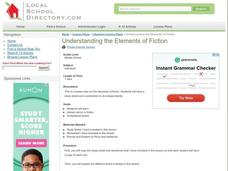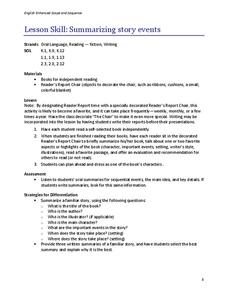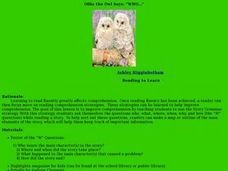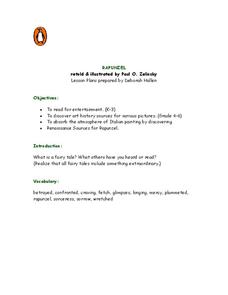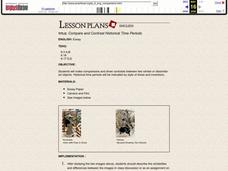Curated OER
My Book Report
In this literacy/writing worksheet, learners compose a book report. Students identify the following literary elements: main characters, setting, beginning, problem and solution. Learners then compose paragraphs for each of these story...
Curated OER
My Book Report
In this book report worksheet, learners answer 7 questions about their book. These include main characters, setting, summary, and a review.
Curated OER
Immigration: Marijana's Story
Second graders explore world geography by researching U.S. history. In this immigration lesson, 2nd graders read the book Marijana's Story and discuss the main character, her goals, and the plot. Students complete a worksheet about U.S....
Curated OER
Understanding the Elements of Fiction
Inform your class on the elements of fiction: themes, settings, characters, plots, dialogue, narration, flashback, clues, climax, resolution. They write the definitions of the terms on the worksheet provided.l Tip: Have them write a...
Curated OER
Summarizing Story Events
Here is a way to build your pupils' public speaking abilities. The lesson describes a reader's report chair, which is used each week by a student who has just finished reading a book. The featured reader sits in the chair and talks about...
Curated OER
Ollie the Own Says: WHO
Scholars examine the strategy of making a story map or outline to identify the main elements of a story. They discuss the who, what, where, when, why, and how of a story, in an outline form. As a class they read a short story, answer the...
Curated OER
Storytime
By reading two books aloud, Ben and Becky in the Haunted House and The Ghost in the Classroom, youngsters learn new words and understand story events. They workin small groups to review the vocabulary in a game-like setting.
Curated OER
Pride and Prejudice: Concept/Vocabulary Analysis
Clarify the setting, literary themes, and potential vocabulary issues with a concept analysis resource. With thoughtful explanations of many parts of Jane Austen's Pride and Prejudice, the reference sheet will be a great...
Curated OER
Map Making
Learners examine a variety of strategies to identify the structure of a story. They listen to the book Where the Wild Things Are and, as a class, complete a story element chart. Students independently read a passage from Charlotte's...
Curated OER
Reader's Theater with a Twist
Second graders create a Reader's Theater script. In this reader's theater activity, 2nd graders create their own script of a story in groups. They make props and act them out on FlipVideo and voice thread.
Curated OER
Language Arts: Retelling Leo the Longhorn
Students reinforce sequencing skills by retelling stories. After being assigned roles in the production, they create dialog, props, and costumes for retelling the story "Leo the Longhorn." Working in cooperative groups, students may also...
Curated OER
Pandora Puppy's Caring Circle
Students are introduced to the concept of compassion. As a class, they read a story together about Pandora Puppy's caring circles and identify the main points. They complete a worksheet and take a test to review how compassion is...
Curated OER
Farm Stories, Animal Webbing, Favorite Farm Animal Graph
Students brainstorm animals they would expect to see on a farm. They save these on a Kidspiration web. Students watch or read a farm story. They discuss the characters. Students vote for their favorite farm animal and crate a graph using...
Scholastic
Quick as a Cricket Lesson Plan
Teaching young learners about similes is easy as pie with this primary grade language arts lesson. Following a class reading of the children's book, Quick as a Cricket by Audrey Wood, young readers learn the definition of a simile...
Curated OER
Knights of the Round Table adapted by Gwen Ross
Everyone loves the tales involving King Arthur and his knights. After reading Knights of the Round Table by Gwen Gross, learners draw inferences and conclusions, analyze story elements, and discuss figurative language, including...
Curated OER
Where the Red Ferns
Where the Red Fern Grows provides the text for a study of the literary elements of plot, character, and setting. Discussion questions and vocabulary lists are referenced but not included.
Curated OER
Writing a Summary
Skim, reread, and then take notes. The step-by-step procedure outlined in this resource can be used to help pupils write a summary of a reading passage. Using their notes, class members then draft a summary focusing on the main idea and...
Curated OER
Rapunzel
Youngsters read the story of Rapunzel and go over vocabulary and answer discussion questions. They also list qualities of characters, discuss settings, make a diorama, and more.
Curated OER
Compare and Contrast Historical Time Periods
What do images tell us about history? Dress, setting, and actions all convey cultural norms, and in essence, give reference to historical time and place. Learners compare and contrast Kunisada's Actor with Flute in Snow to Hokuei's...
Curated OER
Reviewing Main Events in Fiction
Young scholars analyze elements of fiction while reading. In this reading analysis lesson, students read specific texts and retell the information they remember. Young scholars discover how sequential storytelling works.
Curated OER
Colors, Characters, & Clues
Students investigate inferences. They define inference, view a Powerpoint presentation, answer questions about a picture book, and identify clues throughout the story as examples of inferences.
Curated OER
Colors, Characters, & Clues: White Socks
Students examine the process of making inferences. They define inference, view a Powerpoint presentation, and as a whole group locate clues in the pictures of a short story, locating written clues to reinforce their conclusions.
Curated OER
It's Raining Meatballs
Students observe and demonstrate the process of summarization using the book "Cloudy With a Chance of Meatballs" by Judi Barrett. They silently read the story, and as a class discuss the five W's. Students then write a short summary of...
Curated OER
Your Future Occupation
Students write a story about themselves as the main character in a work situation. In this writing perspectives activity, students brainstorm about their future occupation. Students then use themselves as the main character in a short...



